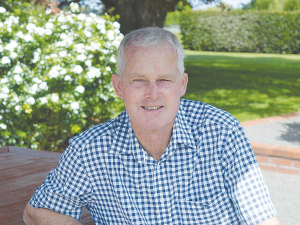DairyNZ opens applications for associate director role
DairyNZ is giving New Zealand farmers a unique opportunity to gain hands-on governance and leadership experience within the dairy sector.
 DairyNZ chair Jim van der Poel says teams will start going to farms from September to talk about how farmers need to report their emissions.
DairyNZ chair Jim van der Poel says teams will start going to farms from September to talk about how farmers need to report their emissions.
A joint initiative where farmers measure, reduce and pay for greenhouse gas emissions rather than being included in an emissions trading scheme swings into action later this year.
Teams from He Waka Eke Noa will start farm visits in September, DairyNZ chairman Jim van der Poel told the South Island Dairy Event (SIDE) in Ashburton last week.
He says over the coming months, DairyNZ and other farmer organisations will be talking a lot about He Waka Eke Noa.
"Teams will start going to farms from Septembe to talk to you in advance about how you need to request your emissions, what farm sequestration you will be able to claim and what pricing mechanisms will be looked at," he says.
Van der Poel later told Rural News that 2017 is the base year and we will all know New Zealand's total emissions from that point in time.
He says from September, He Waka Eke Noa teams will gather exactly what each farmer's emissions are.
"Then there will be incentives put in place because we have got a commitment to get it down by 10% by 2030," he says.
Van der Poel believes some of this will come from productivity and offsetting, but this won't be enough to hit the 10% target.
"So, we will have to come up with a formula," he says.
Those making the most gains will be financially incentivised and those with lesser gains will face a financial cost.
He says it's a work in progress: working out the formula and discussions with Government on sequestration.
Made up of 13 partners - dairy, red meat, horticulture and deer farmers, milk processors and meat companies, Māori and the Ministry for Primary Industries - He Waka Eke Noa is an alternative to farmers being included in an emissions trading scheme (ETS).
Van der Poel says it's an alternative arrangement the sector came to in partnership with the Government and Māori. "The Government's initial view was that farmers producing methane will enter ETS," he says.
The plan was to create a $50m processor tax, which would fund ways to mitigating farm emissions.
"A deal was made that agricultural emissions will not enter ETS," he added. "And we were given five years for all farmers to have a Farm Environment Plan, so they can measure and manage their emissions and we put in place an alternative mechnanism to incentivise best practise."
Van der Poel says, in reality, farmers will pay a price on their methane emissions from 1 January 2025.
"There's no way around that."
However, this will be separate from the ETS and be co-designed by the sector, government and Māori.
He Waka Eke Noa steering group is chaired by Massey University chancellor Michael Ahie and made up of stakeholder representatives.
Fonterra’s impending exit from the Australian dairy industry is a major event but the story doesn’t change too much for farmers.
Expect greater collaboration between Massey University’s school of Agriculture and Environment and Ireland’s leading agriculture university, the University College of Dublin (UCD), in the future.
A partnership between Torere Macadamias Ltd and the Riddet Institute aims to unlock value from macadamia nuts while growing the next generation of Māori agribusiness researchers.
A new partnership between Dairy Women’s Network (DWN) and NZAgbiz aims to make evidence-based calf rearing practices accessible to all farm teams.
Despite some trying circumstances recently, the cherry season looks set to emerge on top of things.
Changed logos on shirts otherwise it will be business as usual when Fonterra’s consumer and related businesses are expected to change hands next month.